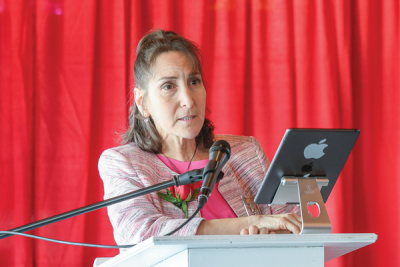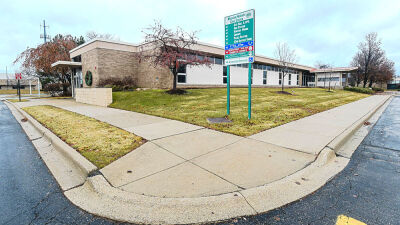
Madison Heights Mayor Roslyn Grafstein discussed major changes to her city’s zoning ordinance during her address March 14, and how the new policy streamlines business applications.
Photo by Patricia O’Blenes
MADISON HEIGHTS — During her State of the Cities Address at Boozy’s Bar & Grill March 14, Madison Heights Mayor Roslyn Grafstein opened with the theme “Loving Our Businesses.”
“I can’t think of a better focus,” Grafstein said at the event, which was organized by the Madison Heights/Hazel Park Chamber of Commerce, and also featured an address by Hazel Park Mayor Mike Webb. “Businesses are the backbone of our city. They fuel our economy, create jobs, shape vibrant spaces, and define our community’s character.”
She said that over the past year, Madison Heights has been modernizing its zoning ordinance.
“Zoning ordinances shape everything from where businesses can operate to what types of buildings can be constructed,” Grafstein said. “Over time, our previous ordinance became increasingly difficult to navigate for business owners, developers, and even residents trying to understand its impact on their neighborhoods.”
To remedy this, changes have been made in the new ordinance, including user-friendly documents with tables and illustrations that clearly show which land uses are allowed and where.
The ordinance also features hyperlinks, allowing prospective developers to easily jump between sections and find the information they need.
“After all, property owners shouldn’t need to hire an attorney just to find out how they can use their property,” Grafstein said.
She also highlighted how fewer public hearings are required now, and more business matters can be resolved administratively behind the counter at City Hall, usually in a matter of days.
“Contrary to popular belief, (City) Council does not need to approve every new business that wants to set up in the city,” Grafstein said.
She said that going forward, the city is eying development types that were once common in the early 1900s, such as apartments above shops, townhouses, accessory dwelling units (granny flats) and duplexes.
“In a city with rising home prices comprised mainly of single-family homes, these options create a healthier mix of residential and commercial spaces,” she said. “We have also expanded permitted uses to include businesses like tattoo artist studios and licensed massage therapy offices, enhancing the vibrancy of our city.”
In addition, the updated zoning ordinance aligns with goals in the city’s master plan, such as making the city more walkable and bike-able. The mayor attributed such changes to the city receiving recognition from the University of Michigan’s eCities program, which awarded Madison Heights a top rating of five stars for its business climate. This is the sixth time it has received a five-star rating.
The city issued nearly 760 permits and approved more than $10 million in new commercial construction during the last year. Nearly $30 million in total construction was completed in 2024.
The mayor also described some partnerships Madison Heights has undertaken to assist business owners. One example is Project DIAMOND (Distributed, Independent, Agile Manufacturing On Demand), billed as the world’s largest 3D printing network, helping manufacturers to modernize their supply chains and business models. Another example are the city’s public-private investments, such as one with McNaughton McKay to improve Pinehurst Drive.
She said the fundamentals of city service remain a top priority. This includes the Department of Public Services replacing nearly 3,900 feet of water main, reconstructing 3,250 feet of residential streets and conducting sectional concrete repair on 4,200 feet of major roads. The city managed 22 snow events and two snow emergences this winter, from mid-November to now. Nearly 30 water main breaks were repaired, more than half of which occurred in 2025.
The city of Madison Heights remains in close contact with the Michigan Department of Transportation and the Oakland County Road Commission regarding traffic backups and road construction as a result of work on interstates 75 and 696, as well as the Oakland County portion of John R Road. The mayor said she also remains committed to fostering a thriving downtown.
“I always tell people (the downtown) is about a mile east of the Royal Oak Farmers Market, with Telway at the center at 11 Mile and John R. And now, we are reshaping its future,” she said.
Grafstein said that with the help of the Madison Heights Downtown Development Authority and an Oakland County placemaking grant for $313,000, the city is launching Phase 1 of its 11 Mile Road streetscaping project between John R Road and Lorenz Avenue, right by Madison High School.
“This transformation will improve traffic safety, enhance pedestrian access, and create an inviting, vibrant atmosphere for businesses and visitors,” she said.
The mayor also highlighted how local businesses have given back to the city, such as marijuana facilities donating to the Madison Heights Community Foundation, which helps fund the Madison Heights Food Pantry, events like Trail Tunes and Revin’ in the Heights, the addition of a disc golf course at Rosie’s Park, the library makerspace and public art displays.
In addition, cannabis company Quality Roots has funded new gateway signage around town, with installations soon taking place at 14 Mile and John R roads, both 12 Mile and 14 Mile roads at Stephenson Highway, and soon the Madison Heights/Hazel Park border at 10 Mile Road and Progress Drive.
Keeping businesses safe helps them thrive, she said. Grafstein praised the work of the police and fire departments conducting routine business property checks, emergency preparedness training and safety audits to provide peace of mind. The city also offers businesses the option to participate in CPR training and discounted AED programs, thanks to the MHFD’s partnership with Stryker.
The MHPD, for its part, was recently reaccredited by the Michigan Law Enforcement Accreditation Commission, demonstrating best police practices.
“When it comes to community safety, we have been proactive in supporting our firefighters and investing in their well-being and effectiveness,” Grafstein said. “I am deeply grateful to our firefighters, paramedics, dispatchers and command staff for their dedication and sacrifices in (keeping) Madison Heights residents and businesses safe.”
She also congratulated Ray Gilson on his promotion as the city’s first deputy fire chief, something the city achieved with savings from a new state law allowing cities to participate in the federal Ground Emergency Medical Transport program, which reimburses cities for ambulance costs. Rep. Mike McFall (D-Hazel Park) spearheaded that legislation.
Grafstein also noted the city’s progress with quality-of-life efforts. This includes a focus on Rosie’s Park, and a $7 million investment for the transformation of Red Oaks Park on 13 Mile Road.
“Through our partnership with Oakland County Parks and Recreation over the last few years, we are now reimagining this 7-acre park with multigenerational features and improved accessibility,” Grafstein said of Red Oaks Park.
She also pointed to the new bandshell at Civic Center Park, which made its debut at last year’s Trail Tunes, funded mainly by a $250,000 grant from the Consumers Energy Foundation. The city is planning its first summer concert series this year, with the bandshell as its centerpiece. The city also has plans for school plays and other local performances using the bandshell.
Separately, a $20,000 grant from the Southeast Michigan Pickleball Association will allow the city to open its first pickleball court at Rosie’s Park this year. The SMPA is also providing guidance on hosting leagues, lessons and tournaments at the new courts.
The mayor also celebrated the success of the all-new Active Adult Center built between the library and City Hall, noting an uptick in attendance and usage.
“As we look to 2025, we remain committed to supporting our businesses in innovative ways,” Grafstein said. “To all our businesses, thank you for choosing Madison Heights.”
Following the mayor’s speech, Madison Heights City Councilman Quinn Wright said the city’s future is looking bright.
“I’m incredibly proud of the strides we’ve made as a city, from modernizing our codes and ordinances to make it easier for local businesses to grow, to launching the co-responder program through the Madison Heights Police Department, which is transforming how we respond to mental health crises,” Wright said. “These are real impactful changes, and I’m excited to keep pushing forward and building a city that’s responsive, innovative and inclusive.”
 Publication select ▼
Publication select ▼



















